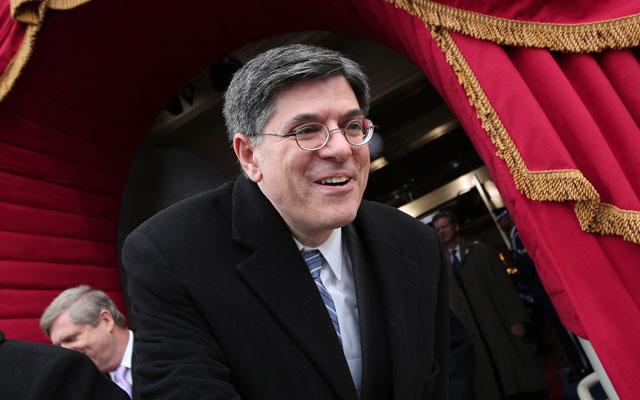President Obama has nominated White House Chief of Staff Jack Lew to succeed Timothy Geithner as Treasury Secretary. Lew could be in for some tough questioning.
For better or for worse, the Secretary of the Treasury stands at the center of the U.S. financial system simply by virtue of the enormous amounts of debt so far sold by the government, by virtue of the Treasury’s role in regulating financial markets, and perhaps most importantly by virtue of the Secretary’s role as chief federal fireman in a financial crisis. For all these reasons, the integrity of the Treasury Secretary should be above reproach.
Of course, the Treasury Secretary should have other qualities in abundance. He or she should be intimately familiar with financial markets and especially with the key players in those markets institutionally and personally. In a financial crisis, this knowledge and these relationships are key to decisive and credible action. However one judges Treasury Secretary Hank Paulson’s performance during the 2008 financial crisis, it is clear that his capacity to act not only devolved from the authority of the office but also from his intimate knowledge of the markets, institutions, and personalities involved.
And the Treasury Secretary should enjoy the confidence of the President under whom he serves. The modern poster child for the contrary was the disastrous performance and deeply frayed relationships of Paul O’Neill during the George W. Bush Administration.
How Does Lew Stack Up?
Which brings us to Jack Lew. The President’s Treasury nominee follows the pattern of James Baker during the first Bush Administration, who went from White House Chief of Staff to Treasury Secretary. Despite some detractors, on balance history has judged Secretary Baker’s tenure kindly.
Prior to his stint as White House Chief of Staff, Lew served as the director of the Office of Management and Budget (OMB). An attorney by training, his only apparent professional association with financial markets began in 2006, when he served in an administrative position as chief operating officer for a Citigroup hedge fund. It is fair to ask, then, whether Lew has the background in financial markets to be Treasury Secretary. In case of emergency, when breaking the glass, would we find a capable responder or an empty suit?
The Sessions Concern
Lew’s recent stint at OMB raises the most serious questions about this nomination, most of all the documented, legitimate questions about his integrity. As Senator Jeff Sessions (R–AL), ranking member on the Senate Budget Committee, details in an article on National Review Online, “Jack Lew’s Campaign of Deception,” Lew is either ignorant of our nation’s fiscal mess—as well as of the budgets he was tasked to produce and defend—or he has some serious issues sorting fact from fantasy. For those who do not know the gentleman from Alabama, Senator Sessions is indeed a gentleman who, while unafraid of partisan politics, does not engage in partisan attacks on a whim. If he suggests smoke, then there’s likely a fire somewhere.
So, what’s this all about? Under President Obama’s budgets as developed and presented by Lew, the nation would rack up trillions in debt over the coming years, despite massive tax hikes. (continues below chart)
Yet in testimony, Lew said, “Our budget will get us, over the next several years, to the point where we can look our children in the eye and say we’re not adding to the debt anymore; we’re spending money that we have each year, and then we can work on bringing down our national debt.”
A lovely sentiment, and the more so were it true. But as the chart shows, it was not true. It was not even close.
Perhaps hoping Lew would grasp that he misspoke, lawmakers pressed him on the matter, yet he repeated himself: “It’s an accurate statement that our current spending will not be increasing the debt.… We’ve stopped spending money we don’t have.” Notice that he is no longer talking about future deficits. This is in the present tense. Well, the deficit in that year exceeded one trillion dollars. (continues below chart)
Unlike most public events, when Administration officials or private citizens testify, they usually have an opportunity to correct the textual record for any misstatements or just poor grammar. As the committee was chaired by Kent Conrad (D–ND), a member of his own party, there can be no doubt that Lew could have corrected his misstatements. He let them stand as the public record. It was the position of the Administration, according to Lew, that we were on a path to balancing the budget, either immediately or in the near future, while in fact the nation was and will be racking up trillions in debt.
Credible Explanations Needed for Senate to Proceed
As the debate over the debt ceiling develops, Congress should settle on a policy of balancing the budget and enact concrete steps now to propel us down that path. Maybe then some future budget director can make the statements that Lew as budget director made and have the statements comport with the truth. That is not the case when Lew testified. It is not the case today.
Maybe there is some credible explanation for Lew’s bizarre statements in direct conflict with the facts, some explanation that would fully exonerate Lew of any suggestion of deliberate deception. We should hope so, but we’re still waiting. And Congress should certainly wait to consider this nomination until Lew provides it.
































